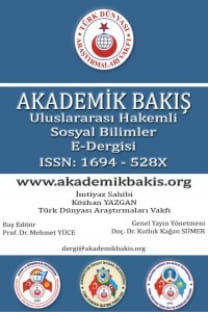THE SHAME OF HUMANITY – HIROSHIMA
Öz
This article aims to examine the messages that Rebecca Lenkiewicz would like to give to the world in her recently unpublished work Wisconsin. In this work the author chooses as the subject the atomic bomb dropped on Hiroshima by America on 6 August 1945 that resulted in the death of approximately 140,000 people and led to a massive destruction. One of the main protagonists of the work is Jinno who managed to survive yet unrecognizable due to the horrible influence of the bomb. Strangely enough, Jinno tries to look for a remedy in America, the very country that caused all her troubles, to regain her health and her lost dreams since some people like her have been invited to America with the promise of treatment. Throughout the play, the reader/audience tries to find answers to two striking questions: Will the desperate young girl be able to regain what she has lost after years of the disaster, and be happy? What is the real reason behind America's invitation of these victims? The author brings this terrible period back on the stage with the play Wisconsin and draws attention to today ongoing massacres, notably in the Middle East.
Anahtar Kelimeler:
Rebecca Lenkiewicz, America, Hiroshima
___
Chomsky, N. (1999). Editions of Media Control: The Spectacular Achievements of Propaganda, Seven Stories Press. Lenkiewicz, R. (2016).Wisconsin, Unpublished Manuscript. Sümer, G. (2008). “Amerikan Dış Politikasının Kökenleri ve Amerikan Dış Politik Kültürü” Uluslararası Ilişkiler Akademik Dergi, Vol.5, No. 19, 119-144. Tolstoy, L. (1993).How Much Land Does a Man Need? And Other Stories. Penguin Classics Coerr, Eleanor. (1977). Sadako and the Thousand Paper Cranes, Putnam Juvenile. Internet Resources Hikmet, N. (1956) "Hiroshima (A Little Girl / The Dead Girl)”. Hiroshima Lyrics English Translation. https://cetinbayramoglusiir.wordpress.com/2011/03/11/kiz-cocugu-nazim-hikmet-ran/ (Retrieved 18 June 2016) Universal Declaration of Human Rights (1948). romohchr.org/EN/UDHR/Documents/UDHR Translations/eng.pdf. (Retrieved 19 June 2016).- Başlangıç: 2004
- Yayıncı: Akademik Bakış
Sayıdaki Diğer Makaleler
THE SHAME OF HUMANITY – HIROSHIMA
TÜRKİYE’DE SERAMİK SEKTÖRÜNÜN DIŞ TİCARET YAPISI: SEÇİLMİŞ ÜLKELER İÇİN KARŞILAŞTIRMALI ANALİZ
Mustafa GÜLLÜ, Hüseyin Naci B BAYRAÇ
KÖSEDAĞ SAVAŞINDA SELÇUKLU ORDUSUNDA GAYRİMÜSLİMLER
TÜRK MÜZİĞİ’NDE DÖNEM ANLAYIŞININ FARKLI PERSPEKTİFLERDEN DEĞERLENDİRİLMESİ
BOZKIR TÜRK KÜLTÜRÜNDE GÜMÜŞ’ÜN ORTAYA ÇIKIŞI VE İŞLENİP YAYILMASI
GEZİCİ ORMAN İŞÇİLERİNİN ÇALIŞMA ŞARTLARI VE KARŞILAŞTIKLARI İŞ PROBLEMLERİNİN ÖLÇEĞİ: İNEGÖL ÖRNEĞİ
